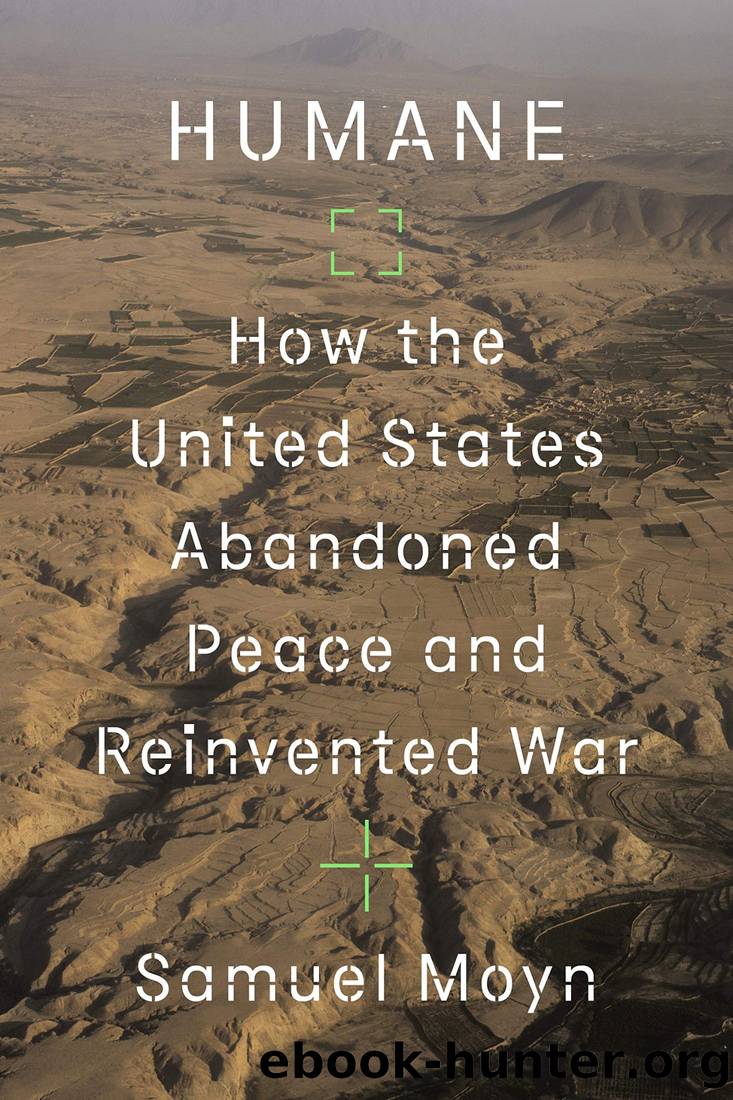Humane by Samuel Moyn

Author:Samuel Moyn [Moyn, Samuel]
Language: eng
Format: epub, pdf
* * *
By the 1990s, a new cultural imperative had been established for humane war, one that did as much to account for the agendas of humanitarians and militaries as anything else. The reorientation went furthest among West Europeans, long since relieved of most imperial obligations and far more reluctant to deploy force globally than they had been in the prior five centuries. It helped that they were sheltered by Americaâs security system. Now not only publics but also leaders were apt to think like the Swiss: humanity in global warfare was one of the most attractive exports of European civilization, like chocolate bonbons or classical music. But ordinary Americans also lived through a profound shift toward a morality attentive to human life ravaged by war.
Americans rethought their wars in the past and other peopleâs in the present. The aftermath of Vietnam retroactively changed the way Americans remember earlier wars their country had been involved in. A representative World War II novel, Sloan Wilsonâs The Man in the Gray Flannel Suit (a smash bestseller in 1955), portrayed a hero whoâlike Samuel Hynesâkills Japanese soldiers with gusto but can still fit in on returning home because the horrors of war âwere simply incomprehensible and had to be forgotten.â Tim OâBrienâs Vietnam novel In the Lake of the Woods, published in 1994 at a very different moment, depicts a veteran who witnessed atrocity and cannot slough it off.
The new sensibility placed Jewish death at the moral center of World War II decades after the fact. Atrocities affecting foreigners and strangers now plucked at heartstrings in the white Christian communities across the Atlantic that once had done the most in modern history to orchestrate such deeds. This rise in moral concern occurred in tandem with the rise of new and often repressive postcolonial states, where strangers were seen to suffer most at the hands of their own leaders. The carnage of World War II had made the creation of a peace architecture a first priority, for Americans and others. The new Holocaust memory coincided with the aftermath of decolonization, and a skepticism along with it that others were up to the challenge of ruling themselves. The result was not a demand for peace but for interventionist justice. These trends were confirmed by the end of the Cold War and the outbreak of civil war on the territory of the composite state of Yugoslavia, which was on European territory but involved unprecedented concern for Muslim victims.
It was no accident that, across these same years, the International Military Tribunal at Nuremberg was rehabilitated in memoryâfalsified, reallyâas an atrocity trial rather than the aggression inquest it had really been. It was a misunderstanding that war crimes in Vietnam and calls to try them had first made imaginable. The far-left Russell tribunal staged its own mock Nuremberg, and there were later and less-radical invocations of the precedent by Telford Taylor and others. In the 1990s, it was as if Nurembergâs stigma on starting wars had never been.
Download
This site does not store any files on its server. We only index and link to content provided by other sites. Please contact the content providers to delete copyright contents if any and email us, we'll remove relevant links or contents immediately.
| Anthropology | Archaeology |
| Philosophy | Politics & Government |
| Social Sciences | Sociology |
| Women's Studies |
The remains of the day by Kazuo Ishiguro(7537)
Tools of Titans by Timothy Ferriss(6929)
The Black Swan by Nassim Nicholas Taleb(6178)
Inner Engineering: A Yogi's Guide to Joy by Sadhguru(5883)
Giovanni's Room by James Baldwin(5868)
The Way of Zen by Alan W. Watts(5785)
The Six Wives Of Henry VIII (WOMEN IN HISTORY) by Fraser Antonia(4784)
The Power of Now: A Guide to Spiritual Enlightenment by Eckhart Tolle(4745)
Astrophysics for People in a Hurry by Neil DeGrasse Tyson(4612)
Asking the Right Questions: A Guide to Critical Thinking by M. Neil Browne & Stuart M. Keeley(4556)
12 Rules for Life by Jordan B. Peterson(3720)
The Ethical Slut by Janet W. Hardy(3489)
Skin in the Game by Nassim Nicholas Taleb(3452)
Housekeeping by Marilynne Robinson(3391)
The Art of Happiness by The Dalai Lama(3374)
Double Down (Diary of a Wimpy Kid Book 11) by Jeff Kinney(3264)
Skin in the Game: Hidden Asymmetries in Daily Life by Nassim Nicholas Taleb(3255)
Walking by Henry David Thoreau(3226)
12 Rules for Life: An Antidote to Chaos by Jordan B. Peterson(3194)
